Chicken Defense
Chicken Defense is an alternative game mode where players and their robot armies attempt to fend off increasingly stronger waves of aliens known as "Chickens" spawning from burrows scattered across the map. When the time comes, they must confront and defeat the Chicken Queen in order to win the game.
Contents
Introduction

The Chickens, a ravenous semi-sapient species of organics that devour all in their path... Their origins are uncertain, but it is already clear that these monstrosities are not the product of natural evolution. Nor would any machine intelligence be utterly insane enough to create such an abomination. Whatever their roots, though, there are more important questions: Do these chicken hives have any ulterior goals?
And if so, how do we stop them?
Playing Chicken Defense









Setting up a game
Chicken Defense can be played by adding a chicken bot of the desired difficulty to the room. There are seven different difficulties:
- Beginner: For absolute strategy game newbies
- Very Easy: For new Zero-K players or when playing PvP
- Easy: Good for less-experienced players
- Normal: A fairly average difficulty
- Hard: Presents a greater challenge; for experienced players
- Suicidal: Exactly what it says on the tin
- Custom: Controlled using the mod options
All difficulties also come in Eggs variants, where there are no mexes and chickens drop twice as many eggs (more on that later). You can set the game to Eggs mode in the Adv Options menu.
The Basics
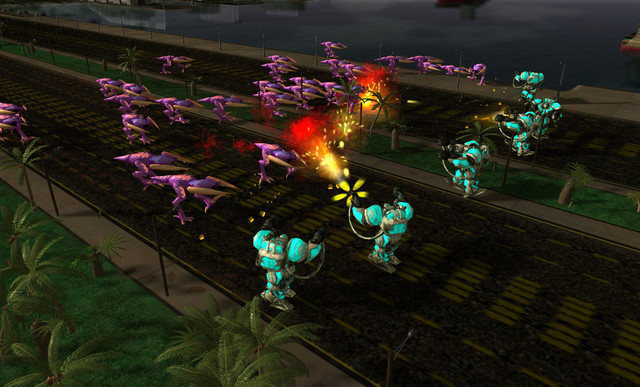
At the start of the game you are given a short time to build, but you will soon be attacked by wave after wave of Chickens.
Two types of chickens will usually appear in each wave, although the hive may simply send a single type.
Initially, you will only be attacked by basic Chickens, which are fairly easy to defeat. As the game progresses, the hive will send increasingly powerful forms, often with unique abilities, to defeat you.
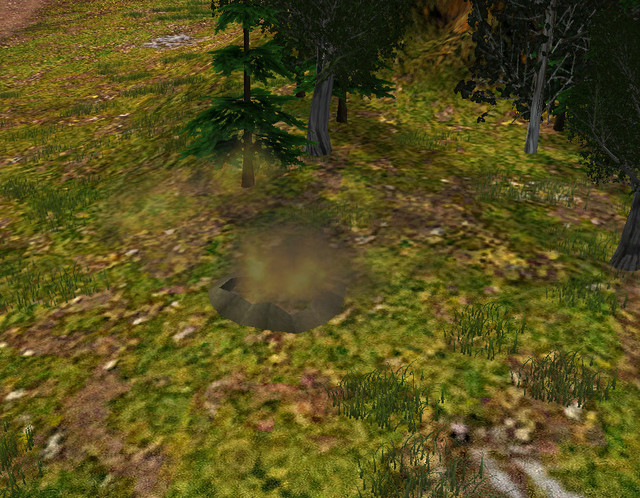
Chickens originate from Burrows, which spawn within a certain distance from player units. At the start of a wave, each burrow sends its chickens at a random unit belonging to the closest human player. When in danger, Burrows can also spawn defensive Chicken Tubes to protect themselves.
The more players there are and the fewer burrows alive, the faster burrows will spawn.
The Hive Anger meter increases continuously over the course of the game.
Chicken Defense has a final boss. When the Hive Anger reaches 100%, burrows stop spawning and the Queen appears. The players must work together to kill her before she flattens everything in her path.
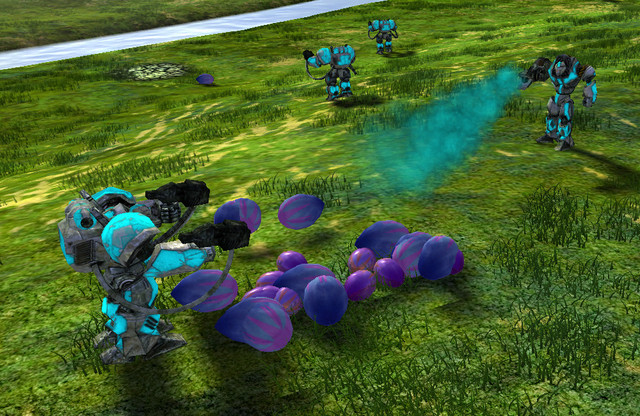
Chickens drop eggs when killed, which can be reclaimed for metal. Burrows also drop multiple eggs when killed.
Hive Tech and Anger
Chickens will gradually upgrade to more advanced forms with the game timer. If the players are not aggressive, the chickens will "tech up" faster. Conversely, killing a burrow will cause the tech meter to regress by a large amount. This means that you can literally bomb the chickens back into the Stone Age (or the Triassic).
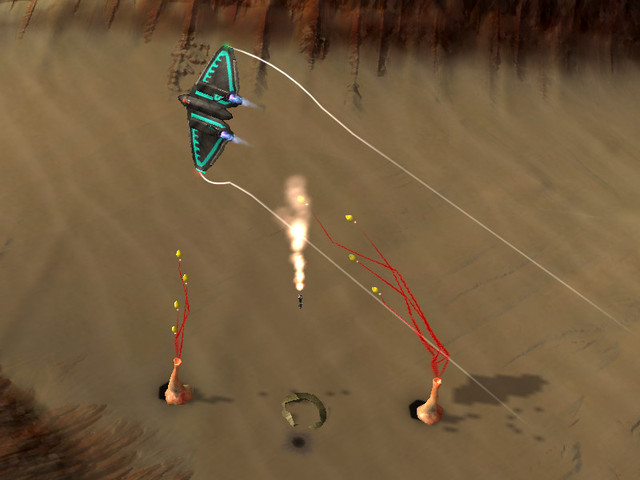
On the flip side, however, killing too many burrows will also cause the hive to perceive you as a greater threat (Hive Anger), increasing the number of chickens spawning and causing the Queen to appear earlier. More defensive Tubes will also be spawned by burrows. It may be necessary to strike a balance between tech and anger.
Note that the chicken tech time modifier cannot be less than -50% of the current game time.
Player Aggression Rating
The PAR (sometimes referred to as "aggro") is an indicator of how aggressively the humans are playing, and controls a lot of the chicken behavior. Specifically:
- The PAR goes up by (1 ÷ player count) when a burrow is killed.
- The PAR goes down by 0.25 every wave.
- Positive values will increase the number of chickens and defensive tubes spawned (to drive back the enemy).
- Negative values will cause the chickens to increment their tech timer.
- Killing a burrow while the PAR is positive will make the queen appear sooner (proportional to the current value of the PAR).
- At sufficiently low PAR values, the chickens will use special "plots" to inflict damage on the enemy base. These range from spawning small digger chickens in the back of the enemy base, to deploying Chicken Spires, to spawning even the vaunted White Dragons.
Generally, it's best to keep PAR at an neutral-ish value (slightly negative to slightly positive).
White Dragons
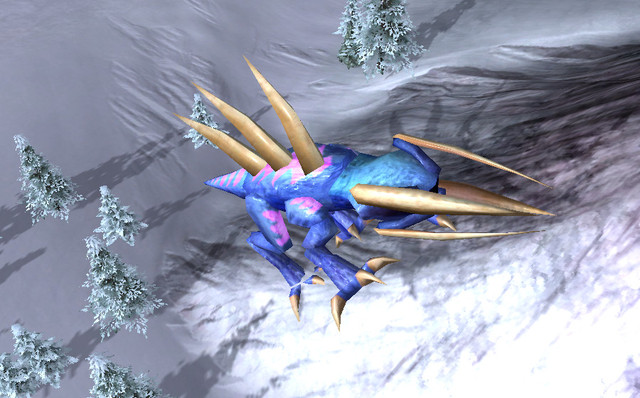
The White Dragons, gatekeepers of the Hive, are deployed when the chickens are sufficiently threatened by their robot enemies. When the Hive Anger reaches a specific point (varies with difficulty level), these dragons will appear at random locations on the map and make a beeline for enemy forces.
Dragons are extremely fearsome close up, but enough sustained fire will take them down. Don't take too long though; while they all spawn at different random locations on the map, things could turn out very badly for you if they link up.
At sufficiently low PAR values, Dragons can also spawn next to a random player structure every few waves.
The Chicken Queen
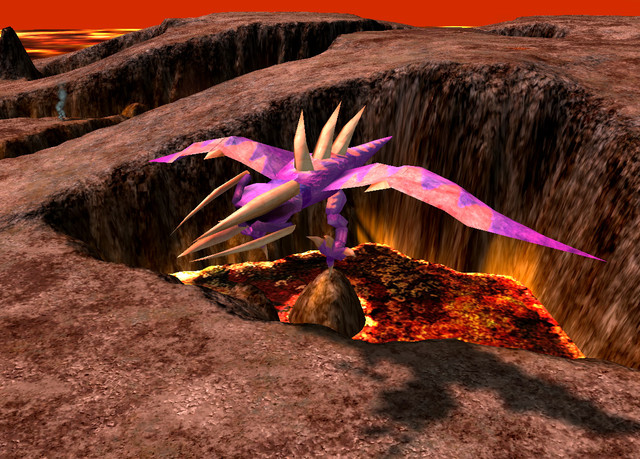
The matriarch of the Chickens, the queen only appears on the battlefield when all else fails. She is an extremely fearsome beast, with jaws of iron, devastating acid bile, and the ability to fire lethal "spores" at land and air targets alike. An extremely tough hide, multiple organ redundancy and rapid cellular regeneration enable her to survive seemingly impossible amounts of enemy fire.
Like the Dragons, the Queen appears at a random place on the map, at a minimum distance from player units. In addition to attacking the enemy, she also functions as multiple mobile burrows in one, spawning chickens during waves.
The queen becomes progressively more resistant to damage with an increasing number of players. Additionally, as she takes damage, she gains new attacks including another spore spray, dropping Dodos, and even Basilisks or Tiamats (in addition to any chickens spawned during waves).

Oh, did we forget to brief you? After a certain amount of time in the air, the Queen can land. She has a slightly different suite of attacks here, and can take quite a bit more punishment. She doesn't stay on the ground though, after a similar period of time she'll take to the sky again.
The Chicken Panel
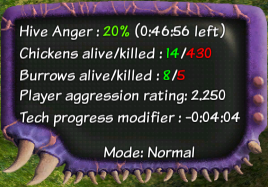
The Chicken Panel gives you all relevant information on your current Chicken game.
The main display shows you the current Hive anger and projected time to queen arrival, the number of chickens and burrows alive at present and total kills, the tech time reduction from burrows, and the difficulty. Mousing over each entry (except difficulty) gives you additional information:
- Hive anger increase from each burrow kill; projected White Dragon arrival time
- Chicken wave frequency; breakdown of live/killed chickens by type
- Frequency of burrow spawns under current conditions; burrow respawn chance
- Tech time increase per wave per burrow; reduction thereof from kill
PvP Mode
PvP mode (where chickens are added to a normal player vs. player game) works slightly differently. The queen does not attack at 100% Hive Anger; instead, regular waves of White Dragons will appear and pummel the players until all burrows on the map are removed.
No reduction occurs in either chicken or burrow counts compared to regular mode, so this can be much harder than normal mode!
Tips and tricks
Take as many mexes as possible at the start of the game. Dedicated Chicken maps tend to have all the mexes on one side, which is helpful.
Have a lot of buildpower handy to deal with the excess of metal you should have.
Always be building better defences.
While in theory Chicken Defense is not a tower defense game, it can be perfectly viable to go full tower defense mode, with the PAR being a bit negative or a bit positive. While chicken artillery (in particular Blobbers) as well as PAR (Player Aggression Rating) are meant to penalize tower defense, these game design counter-measures to turtling/tower defense may not work in practice, for multiple reasons: Counter-artillery static artillery such as Cerberus and mobile artillery such as Merlins out-range Blobbers, and Blobbers might wander (or be pushed forward by other chickens) into range of Lucifers. Further, burrows might spawn within range of your static artillery, enabling you to prevent your PAR from becoming too low without having to venture outside of your base (this does depend a lot of the map and on how lucky/unlucky you are with the burrow spawns).
In some maps with some settings, going full on aggression and getting as high a PAR as possible can work out. This relies a lot on getting all mexes, getting all the metal from chicken eggs, and preparing for the chicken queen arriving early due to the PAR becoming very high.
Don't forget light superweapons. Disco Rave Party's high angle setting can deny huge areas to the Chicken onslaught, and Big Bertha can blow holes in high Chicken density areas.
The queen's health scales somewhat with the number of players: 1.5 times health for 2 players, 2 times health for 3 players, 2.5 times health for 4 players, etc. The chicken queen's health also depends on the difficulty setting. This means that for maps, settings and player approaches where the majority of the metal income comes from mexes and thus more players does not mean significantly more metal income, defeating the chicken queen and winning the game can become much harder the more players there are. Therefore, keeping the number of players at 1 or a few, or picking larger maps with more mexes and more metal income, or increasing the mex metal income multiplier, can help balance the map. A larger map may also be more suitable for multiple players.